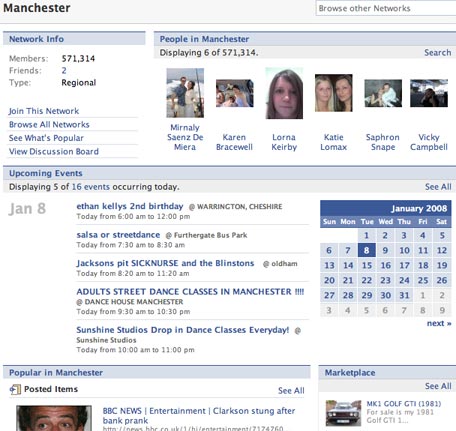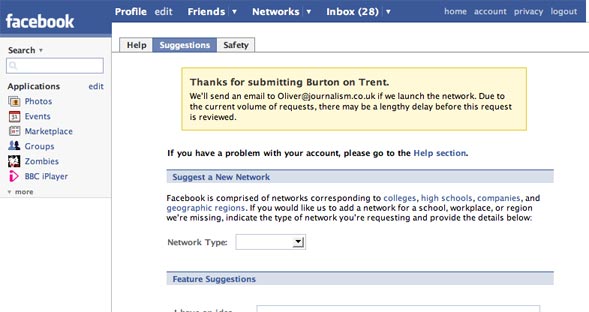‘ScribbleSheet launched in September as an easy, open platform for people with an opinion that they want to share.’
Category Archives: Citizen journalism
Nokia mobiles gets a multimedia blog publishing application
Telewaving is today launching Wavelog, an application that allows users to post multimedia content directly from Nokia mobile phones to blogs.
The Wavelog system works with s60, the software run on smart Nokia multimedia phones like the N95.
According to the developers the software, which was developed and tested on Nokia N95 mobile phones posting to the WordPress, can run on any blogging platform.
The system sounds similar to the software developed by Nokia and Reuters for their mobile journalism project.
That system allowed journalists to upload multimedia reports from their N95 phones to a back-end WordPress blog that desk editors would then have access to.
The Telewaving system is also able to upload text, images, audio, and video and is able to upload over any network connection (this may just be US networks, though).
Death of Chinese ‘citizen journalist’ sparks online outrage
A Chinese man, who used his mobile phone to film a confrontation between the authorities and protesting villagers in the country’s central Hubei province, was beaten to death by city officials, according to a report by CNN on Friday.
The death of Wei Wenhua, a 41-year-old construction company executive, has been widely condemned across online forums and news sites in China, the article states.
“Wei is the first ‘citizen journalist’ to die in China because of what he was trying to film,” a statement from press freedom campaign group Reporters Without Borders said.
“He was beaten to death for doing something which is becoming more and more common and which was a way to expose law-enforcement officers who keep on overstepping their limits.”
Press Gazette: Mapping web censorship
A new online project launched by blogger and citizen journalist advocates Global Voices aims to highlight censorship of social networking websites around the world.
Yahoo to open up mobile web pages to developers
Yahoo will let widget developers run riot over its new mobile web platform, according to the Media Info Centre blog.
It also reported that Yahoo! has also unveiled a redesigned home page for mobile phones that lets users decide the content they want highlighted on the page.
It also released an upgrade to its Go software to aid surfing on mobile phones and to enable Yahoo to show ads with graphics.
NYTimes.com launches Polling Place Photo Project and asks users to submit
NYTimes.com has launched the Polling Place Photo Project, its bid to document the election year with photos taken by its readers.
The Times is asking for submissions of every polling location in America during the 2008 primaries and general election, so that it can compile an archive of voting in the US.
Images of the New Hampshire primaries have already been uploaded to the developing site.
Facebook useful to local news? If it opened up the networks
The Guardian may be adopting strategies to make itself more Facebook-friendly but the lack of truly local geographical networks on the social networking site makes it more difficult for smaller papers to make great use of it.
The UK currently has 17 regional networks that users can become part of, here they are:

The regional networks, which unsurprisingly centre on larger towns and cities, offer reporters a great ‘in’ to the online community on their patch. A reporter working for the Manchester Evening News, for instance, or one of its smaller titles in the Greater Manchester area is at a distinct advantage over a reporter working on a paper in a smaller town:
Just a brief, cursory glance at the Manchester group throws up leads for several potential stories amongst its 500,000 plus members. The ‘See what’s popular’ feature and the discussion board make it a simple place to seed stories as well as one in which to ask for information and pick up leads. But where would you go if you lived in Burton on Trent?
Burton is a town in Staffordshire that – if you’ve defining it in terms of Facebook regions – is slap bang between Nottingham and West Midlands. Not much use then if you’re a reporter on the Burton Mail.
Burton has 103 groups related to it on Facebook – a lot of ground to cover for any hack – but like many other towns across the UK it has no network and Facebook doesn’t allow users to establish there own networks. Users have to make that request to the site:
If Facebook gave it’s users the ability to create these networks themselves it would solve a lot of headaches, but don’t expect that to happen in a hurry. So come on reporters on papers in Burton, Derby, Reading, Cardiff, Norwich and the like. Get a campaign going to get your town recognised as a network on Facebook. It can make the day job a hell of a lot simpler.
‘Journalism without journalists’
“Network publishing is the natural ally of traditional media,” concludes Michael Maier, founder and CEO of Blogform publishing, in his essay ‘Journalism without Journalists: Vision or Caricature?’
In the essay Maier, who founded Germany’s first online-only newspaper Netzeitung and the Reader’s Edition – a site entirely constructed from reader-submitted content, examines projects that have experimented with collaborative journalism projects from citizens and journalists such as the LA Times’ ‘wikitorial’, Dan Gillmor’s ‘bayosphere’, and the Chi-Town Daily News.
In summary, the lessons Maier took with him from these experiments to the Reader’s Edition were:
- There needs to be a hierarchy of control over reader’s input;
- Collaboration means working together – reader’s should be encouraged and motivated by journalists not neglected in carrying out their work;
- “Readers who write hardly think about other readers. They are driven by self-realization.” – the content that readers submit must still address the audience’s interest;
- To traditional media – do not view blogs as a quick-fix solution: “Several attempts have been made to integrate bloggers into old institutions in order to inject fresh air, but it was not the traditional media that changed through these efforts. Rather, the bloggers lost their spicy language and became tame to please their old-news bosses.”
Perhaps the greatest barrier to successful collaboration between traditional media and what Maier describes as network publishing, he suggests, are profit margins.
“Every day we hear the latest reports of sinking profits for newspapers. Traditional media are trying to remain profitable largely by cutting costs. New journalistic projects are—either willingly or unwillingly—nonprofit.
“The enormous pressure of the market encourages compromise, and I truly hope that NP’s [network publishing] experimental character can be saved from that. A clear focus on the reader is key to a lasting success.”
Citing the success of the Associated Press’ merger with NowPublic.com and Reuters work with Global Voices, Maier argues that it is such collaborative efforts that will shape the future of journalism – for the better.
“Ultimately, it won’t be the angry bloggers or the clueless citizen journalists, not the crazy kids from YouTube or the dark forces behind MySpace who will decide the fate of journalism. Ultimately, readers and advertisers will show what they are willing to pay for. Network Publishing is the natural ally of traditional media. Even in a completely new media world, together, they can help ensure that society gets the kind of journalism it deserves.”
Searchable Twitter makes it more robust for news
Thanks to Cybersoc for drawing attention to Tweet Scan, a site that allows you to keyword search public Twitter messages – another useful addition which makes it even less arbitrary and more newsworthy.
Twitter’s credo as a mainstream news device has been growing over the last few months. In September it launched a tracking service that allowed users to follow phrases on mobiles and through IM and it was used to good effect to follow real time reports of last year’s fires in East London and the Californian bush.
Robin makes the point that it’s a great resource for journalists looking for firsthand accounts from people close to events. To that I’d add it’s ability to mix professional and non-pro accounts around a topic. It’s short nature also lends particularly well to reporting traffic problems and other necessary travel information.
How I really want to see it used though is by a UK news publisher, be it national, regional or local, on a breaking news story. Be bold, I say.
Get an RSS feed from a Twitter search term embedded into a blog or on the news pages updating the user with alerts from the public and other news sources about breaking news events.
Happy New Year – and good luck looking for a new job…
Spare a thought for the staff at The Post in Cincinnati. The local paper had been publishing for 126 years but on New Year’s Eve it printed its last edition and by New Year’s Day a web-only version had risen from the ashes to replace it – although staffed by just a smattering of former employees.
Just two reporters are expected to work fulltime on the new website from a former staff of fifty. With the shortfall in stories being made up by freelancers, the wires, the public and the local TV station.
So you’d think, given the time of year and the circumstances the paper found itself in, there would be call for a bit of a wet New Year’s wake? Not even that.
Gawker has a memo from management to the staff detailing the grim realities and processes they have to go through as the newspaper shuts down. It details how staff are even unable to drown their sorrows at their own leaving do:
“John Vissman will arrange for food, beverages and treats for all as we get the last editions out, clean out our desks and say good-bye. But . . . tempting as it may be . . . please do not bring any alcoholic beverages into the newsroom. Let’s go out like the professionals we have been these last, difficult weeks.”
Pro or not, I don’t think one for the road would have been too much to ask…

